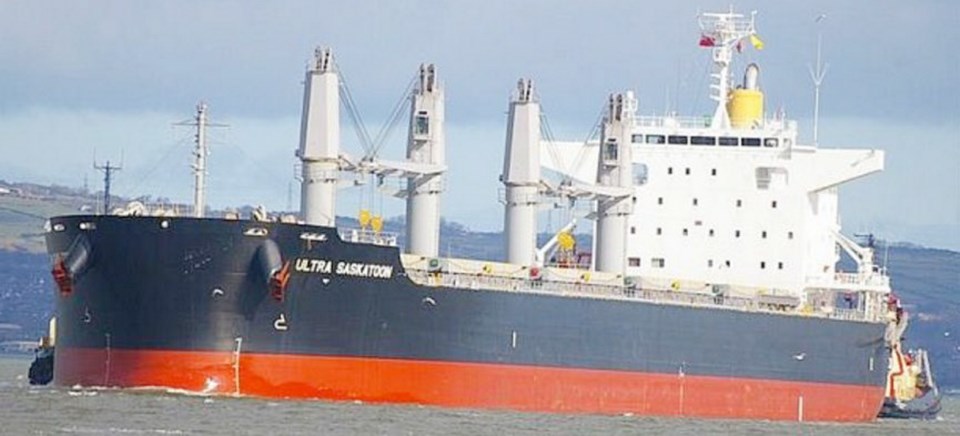Commercial ocean-going ships reported being involved in at least 14 official occurrences on the B.C. coast last year, including collisions, groundings, mechanical breakdowns at sea and close calls with other vessels, federal transportation safety board reports show.
While not all involved accidents, some had the potential to be extremely serious, including the Japanese-owned 200-metre bulk carrier Ultra Saskatoon on July 2 reporting a “close-quarters situation” with the Hong Kong-owned 217-metre bulk carrier Great Loyalty near Race Rocks marine reserve off Victoria.
The incident was not investigated by the safety board, and the summary report does not indicate how close the two ships came to a collision.
The safety board recorded a total of 267 commercial shipping occurrences in the western region in 2014 — down slightly from 274 in 2013 — including 150 incidents, 95 shipping accidents and 22 accidents aboard ships.
Mohan Raman, manager of regional operations for the safety board, said from Richmond office that a close-quarters situation occurs when a ship “comes so close to being involved in a collision that a threat to the safety of any person, property or the environment exists.”
The freighters were both outbound on the Canadian side of the Juan de Fuca Strait shipping lanes and the B.C. pilots had recently disembarked. The owners of the two ships declined requests for comment.
Kevin Obermeyer, president and CEO of the Pacific Pilotage Authority, said ship captains may have different interpretations on what constitutes a close call. “If you cut across my bow and tick me off, I’m going to call VTS [Vessel Traffic Services] and say there was a close-quarters situation and report you.” It’s possible that one ship was executing a right turn off Race Rocks more slowly and the other vessel caught up with it and communications between the two were poor, he said.
Obermeyer said that typically the bigger risk of collision involves, say, a freighter with pleasure craft or a smaller ship not “realizing a large ship cannot stop on a dime.”
The container vessel Ever Unific reported a close-quarters situation with the sailing vessel Silver Lining in Vancouver on July 27. One month later, the bulk carrier Theresa Shandong reported a near collision with a sailing sloop in English Bay. The bulk carrier was required to go full astern to avoid a collision.
B.C. pilots on outbound ships disembark at Race Rocks, leaving the ships’ crews to navigate on their own through Juan de Fuca Strait to the open Pacific.
That could change soon for oil tankers with a dead weight tonnage of 40,000 or greater. The change is triggered by Kinder Morgan’s planned twinning of its Trans Mountain pipeline from Alberta to B.C. — a proposal still under review.
About five double-hulled tankers ship oil out of Kinder Morgan’s Westridge Terminal each month in Burnaby. That number would increase to 34 tankers a month.
Currently, outbound oil tankers have two B.C. pilots on board. They get off at the pilot station at Brotchie Ledge, a submerged reef just off Victoria. A tug escort continues with the oil tanker until just past Race Rocks, another 12 nautical miles. The plan is to have the pilots also stay until Race Rocks, and the escort tug to continue until J Buoy, at the entrance to Juan de Fuca Strait, another 57 nautical miles. Bulk carriers do not require tug escorts.
Obermeyer said his office is looking to contract with a helicopter firm to land on the ships’ decks to remove the pilots; the alternative method would be by pilot launch.
The U.S. stations a tug at Neah Bay at the tip of the Olympic Peninsula to provide assistance should a ship get into trouble.
The safety board in 2014 conducted investigations into groundings of two ocean-going ships that had B.C. pilots on board.
On Jan. 25, the container ship Cap Blanche inbound for Fraser Surrey Docks grounded near Steveston, but was able to refloat itself without the assistance of tugs and proceeded to the berth. A safety board report found that fog, imprecise navigational information, and lack of ship communications were all factors.
Another board report is expected this fall into the July 14 grounding of a bulk carrier in the outer harbour of Prince Rupert.



